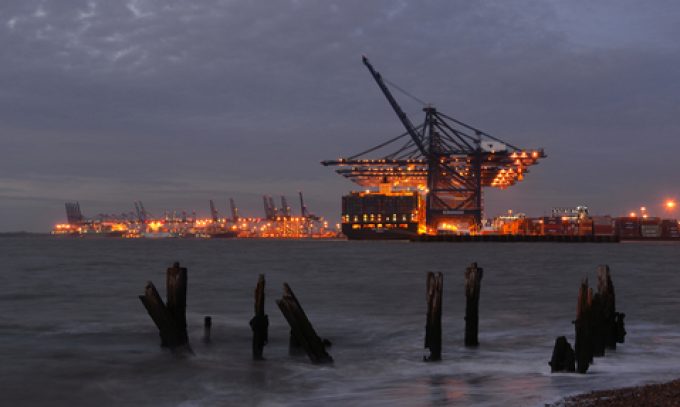Q1 'better than expected' for Maersk – but 'there's more pressure to come'
Stronger-than-expected demand and continuing disruption from the Red Sea crisis produced a better-than-expected return for ...

Container shipping lines are looking for a hike in Asia-Europe spot freight rates, announcing a series of new prices from 1 May to ports in North Europe and west and east Mediterranean.
It follows a week in which spot rates on the Asia-North Europe and Asia-Mediterranean destinations resumed their gentle downward slide, according to the weekly price indices produced by Drewy and Xeneta.
The Shanghai-Rotterdam leg of Drewry’s World Container Index (WCI) recorded a spot rate of $2,989 per 40ft, down 2% week on week, while Xeneta’s XSI registered a 4.5% week-on-week decline, to $3,215, on its Asia-North Europe route.
This week, MSC announced a new FAK (freight all kinds) rate of $4,500 per 40ft high-cube on Asia-North Europe shipments from 1 May and CMA CGM a new FAK rate of $4,000 on the same route, while Hapag-Lloyd suggested a far less ambitious price of $3,100.
The hikes are likely to be more marked on the Asia-Mediterranean trades, where Drewry’s WCI recorded a 2% decline, to $3,577 per 40ft, on its Shanghai-Genoa leg.
MSC is looking for an FAK rate of $5,400 per 40ft for west Mediterranean ports and $5,600 for east Mediterranean from 1 May. CMA CGM announced an FAK rate of $5,200 and $5,300 for the west and east Mediterranean respectively, and Hapag-Lloyd $3,500 and $3,900.
On that basis, it would appear that the German carrier’s ambition is to largely keep Asia-Europe rates at current levels, while CMA CGM and MSC are banking on demand holding and a continuation of the Red Sea crisis to prop up pricing.
The Middle East conflict continues to disrupt shipping and shake up networks. Maersk announced today it was effectively transforming its ME2, Middle East/India-Mediterranean, service into a North European loop.
Listen to this clip from the latest episode of The Loadstar Podcast to hear about what escalating conflict in the Middle East means for supply chains:
The previous port rotation, which began in Mundra and featured a variety of calls in the Gulf and Red Sea before transiting Suez and calling at Spanish and Italian ports before turning at Tanger, has been discontinued. Mediterranean ports will now be served via transhipment from Tanger, and the service has been elongated to include new calls at Felixstowe, Rotterdam and Bremerhaven.
Maersk said this was to cater for increased demand from Indian exporters struggling with capacity constraints and sharply increasing prices since the Houthi attacks began.
The carrier said: “This strategic extension of the ME2 service to key destinations in North Europe will benefit North India’s exporters, particularly those in the lifestyle and retail sectors.
“The transit times for ocean transports between Mumbai ports and North Europe will be shortened by five to seven days.
“In the same way, on the backhaul from North Europe to India, the importers for the automotive sector will benefit from quicker transit times for automotive components coming into India,” it said, adding that two more vessels would be added to the service “to accommodate the extended coverage in North Europe”.
Meanwhile, the Asia-North America trades saw further decline this week: the core transpacific route to North America’s west coast declined 4% on both the XSI and WCI, which ended the week at $3,318 and $3,487 per 40 ft, respectively.
The WCI also recorded a 5% week-on-week decline on its Shanghai-New York route, to $4,453, as capacity restrictions at the Panama Canal finally began to ease.
One bright spot for east-west carriers was on the transatlantic, with the WCI recording a 3% gain, to $2,291 per 40ft – although that is still 53% down year on year – while the XSI stood at $2,086, 4.5% up week on week and 34% down year on year.
Comment on this article